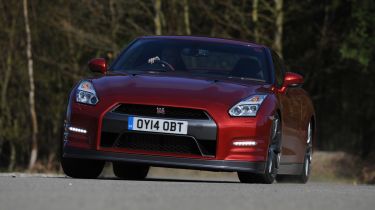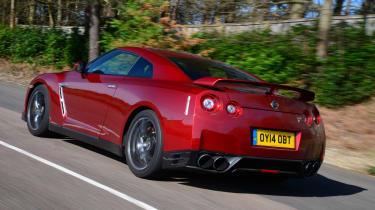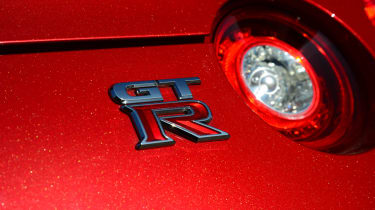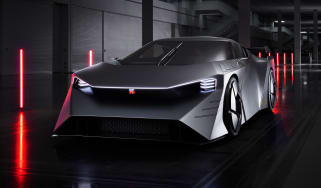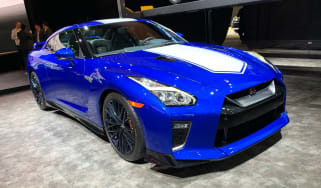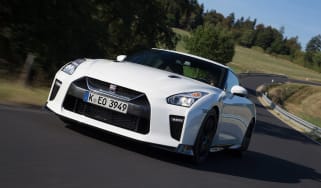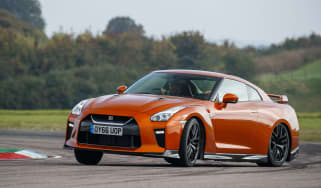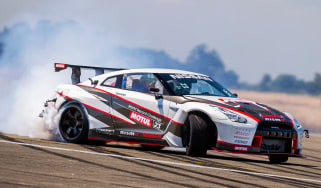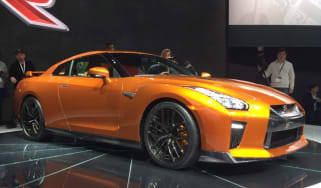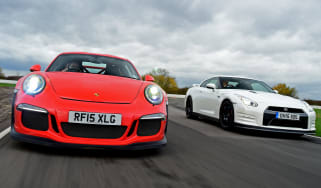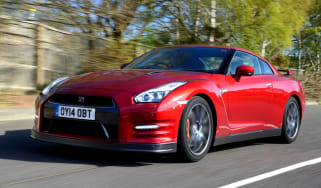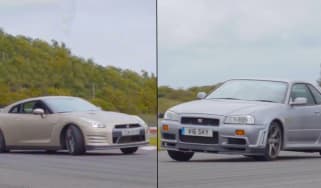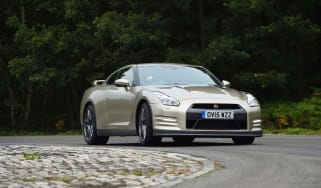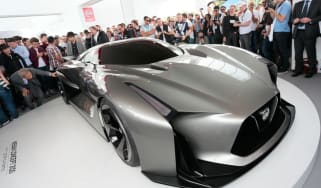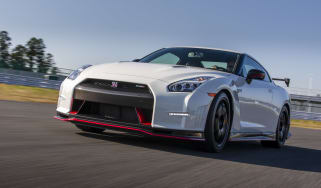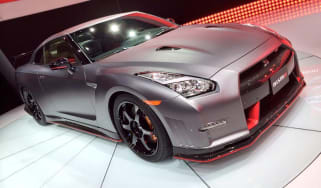Nissan GT-R (2009-2022) review
Japan’s iconic super coupe is showing its age, in spite of immense performance and a high-tech image

The Nissan GT-R has been with us for over a decade, but over that time the Japanese sports car has evolved, increased in price and successfully remained in contention with the best cars in the class – at least from a performance standpoint. Grip levels are stupendous, traction is tenacious and the acceleration on tap is awe-inspiring thanks to its fearsome twin-turbocharged 3.8-litre V6.
Despite its incredible performance, the GT-R feels a little dated next to a host of modern, more sophisticated rivals. The Nissan’s inflated price has put it up against talented rivals including the Porsche 911 and Aston Martin Vantage – both of which feel more special and nuanced. If sheer point-to-point speed is your goal, however, the GT-R still takes some beating.
About the Nissan GT-R
The Nissan GT-R has done an epic job as the Japanese marque’s performance flagship, with few cars able to catch the imagination of young enthusiasts in quite the same way. A carefully propagated PR and marketing effort before and after the GT-R’s 2007 launch cast the bruising coupe as a manga-style superhero, and thanks to a formidable investment in engineering and technology, the new model’s performance exceeded the hype. Rave reviews followed, and Nissan’s re-imagining of a little-known Japanese cult car born out of circuit racing in the late 1960s took the world by storm.
Used - available now

2021 Lexus
ES
9,865 milesAutomaticPetrol2.5L
Cash £30,400
2022 Nissan
Qashqai
18,246 milesAutomaticPetrol1.3L
Cash £21,850
2022 Fiat
500e
16,714 milesAutomaticElectric
Cash £12,000
2022 MG
ZS EV
7,696 milesAutomaticElectric
Cash £16,300The current model is codenamed R35 by the factory, and it’s not the first GT-R to be sold officially by Nissan in the UK. The firm brought a limited number of R34 models over in the late 1990s, with more cars arriving independently as so-called ‘grey imports’.
Like its predecessors, the big Nissan GT-R is a technological tour de force that uses mechanical and electronic wizardry to make it one of the fastest accelerating cars for sale in the UK, even at nearly 15 years since its arrival.
The GT-R has a 0-60mph time that has been recorded as low as 2.7 seconds for the standard car, although Nissan doesn't currently quote a 0-62mph time in the GT-R brochure. However, this time puts it on a par with the fastest hypercars, as well as the all-electric Tesla Model S. While that car is a luxury car that's fast in a straight line, the GT-R uses motorsport-developed technology to deliver near-unbreakable grip and involving handling.
Power comes from a twin-turbocharged V6 engine (called VR38DETT) which has been upgraded over time, with output growing from 473bhp at launch in 2007 to 562bhp, or 592bhp in the GT-R Nismo. Every GT-R comes with four-wheel drive and a 6-speed twin-clutch automatic gearbox with paddle shifters. There's a limited-slip differential, adaptive dampers and a host of electronic driver aids on board that help move power between the wheels to deliver incredible traction and grip, although later cars have been tweaked to deliver a more involving driving experience.
This equipment helps the GT-R to feel more agile than its 1,752kg kerbweight would lead you to believe, and the GT-R is an engaging driver's car on the right road. However, it's also a very compromised sports car. While the four-seater layout is practical, and there's even a decent boot, the firm ride, even in the most comfortable damper setting, means the GT-R is an endurance in everyday use, while the complex four-wheel-drive transmission ties itself in knots when manoeuvring at low speeds.
As well as the standard GT-R, Nissan offers the even faster GT-R Nismo, which has been fettled by Nissan's motorsports division to offer an even more focused performance. This includes lighter Rays forged alloy wheels and a carbon fibre bodykit that improves aerodynamics, as well as the more powerful 592bhp engine. The Track Edition bridges the gap between the standard GT-R and the Nismo, as it has the Nismo's Rays wheels and Nismo-tuned dampers, but does without the Nismo's bodykit or extra power.
Time has seen the GT-R get more power, but it has also seen prices rise at a dramatic rate. When launched, the GT-R cost around £55,000, making it something of a performance car bargain. But today Nissan makes you pay for the GT-R's badge appeal, with a starting price of around £84,000, while the Track Edition is over £100,000 and the Nismo is priced at £184,000. Those are big numbers to swallow, especially when you consider the car's age.
For real connoisseurs of the GT-R brand, the ultimate option is the limited edition GT-R50 by Italdesign revealed in 2020 to celebrate its 50th anniversary. With stunning bespoke bodywork and a power hike to 710bhp, production has been limited to 50 examples costing almost £900,000 each. Collectors only needed to apply...
There aren't really any direct rivals for the Nissan GT-R. The Audi RS 5 Coupe comes closest to the four-seat, four-wheel drive coupe formula, but it can't match the GT-R's performance. Instead you'd need to look at the Audi R8 for similar pace, or the Porsche 911 Carrera 4 or Panamera. However, all of these cars have a far greater finesse than the GT-R.
Elsewhere, if a hi-tech Japanese sports car floats your boat, then the Honda NSX is available, or even the Lexus LC. Or you might consider the Toyota Supra, another car that trades on its heritage, but with a far more reasonable price. But if straight-line acceleration is what you're after, then the Tesla Model S with Ludicrous mode is about the only car at a similar price that can carry four (or more) and deliver the same kind of acceleration.
Nissan Skyline GT-R history
The current R35 Nissan GT-R can trace its roots to 1969, when the first GT-R arrived as a high performance version of the Nissan Skyline. The first Skyline GT-R is known as the KPGC10, which was sold as a four-door saloon, then a two-door coupe. It used a 2.0-litre straight-six and five-speed manual gearbox, and this layout was also used for the second GT-R, the KPGC110, launched in 1973.
The fuel crisis of the Seventies saw the GT-R disappear, and only 197 GT-R Mk2s were built, making it a highly collectable classic today. The straight-edged Skyline GTS-R of the Eighties filled the void left by the GT-R, especially in motorsport, while the all-new R32 Skyline GT-R arrived in 1989. This car featured the basic ingredients of the current car, with four-wheel drive, and a twin-turbo six-cylinder engine. Racing versions dominated Group A touring car racing where the GT-R first earned the nickname Godzilla. Eventually the R32 GT-R was outlawed, essentially for being too competitive.
The R33 GT-R was larger and more hi-tech than the R32, and it arrived in 1995, while the R34 Skyline GT-R arrived in 1999. These models pushed the technology envelope even further. The R33 GT-R had a brief adventure at the Le Mans 24 Hours, but the later R34 GT-R only appeared in the Japanese SuperGT domestic sports car championship.
When the current R35 GT-R was revealed in 2007, it was five years after the R34 was dropped. As well as continuing to compete in the SuperGT championship, the GT-R has become a competitive racer in various GT3 sports car racing series across the world, while Nissan's ill-fated 2014 Le Mans entry was named the GT-R LM Nismo, although shared nothing technical with the road car.
One thing that has helped the Nissan GT-R establish itself as a fan favourite is its appearance in the entertainment industry. Whether it's video games such as Gran Turismo and Need For Speed, or the Fast And The Furious movie franchise, these outlets have helped the GT-R gain mythical status with fans.
